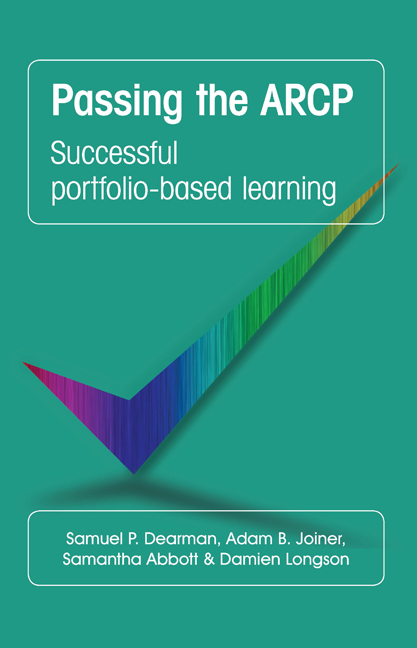Book contents
- Frontmatter
- Contents
- Authors
- List of figures
- Foreword
- Preface
- Acknowledgements
- List of abbreviations
- How to use this guide
- 1 Quick reference guide
- 2 What is a portfolio?
- 3 Lessons learned so far
- 4 Organising the portfolio
- 5 Managing your workplace-based assessments
- 6 Reflective practice and self-appraisal of learning
- 7 Audit and research
- 8 Teaching
- 9 Psychotherapy experience
- 10 Management and leadership experience
- 11 Appraisal reports, planning meetings and educational objectives
- 12 Other experiences, achievements and documents
- 13 The future of portfolios
- Index
9 - Psychotherapy experience
- Frontmatter
- Contents
- Authors
- List of figures
- Foreword
- Preface
- Acknowledgements
- List of abbreviations
- How to use this guide
- 1 Quick reference guide
- 2 What is a portfolio?
- 3 Lessons learned so far
- 4 Organising the portfolio
- 5 Managing your workplace-based assessments
- 6 Reflective practice and self-appraisal of learning
- 7 Audit and research
- 8 Teaching
- 9 Psychotherapy experience
- 10 Management and leadership experience
- 11 Appraisal reports, planning meetings and educational objectives
- 12 Other experiences, achievements and documents
- 13 The future of portfolios
- Index
Summary
Psychotherapeutic skills and experience within different schools of therapy remain an important part of training. The portfolio should therefore not simply record the fact of courses, training and experience in a certain area, but should also detail knowledge, skills and attitudes in this respect and how they have been integrated into competent practice.
Recording activity and competence
Over the course of 3 years’ basic training, trainees should build up a catalogue of experience. Presenting an account of this is part of demonstrating development and will usually include:
• previous Balint group involvement
• interview skills training
• specific forms of therapy, including cognitive–behavioural therapy, cognitive analytic therapy and psychodynamic therapy with associated feedback
• training days or courses
• other specific experience.
During the years of core training, trainees need to demonstrate a level of general psychological competence. This essentially entails being able to account for clinical phenomena in psychological terms, demonstrating advanced communication skills and advanced emotional intelligence in dealings with patients and colleagues. At later stages, this will more specifically involve demonstrating appropriate referral for formal psychotherapies, jointly managing patients receiving psychotherapy and delivering basic psychotherapeutic treatments and strategies where appropriate.
At the time of writing the minimum requirements for demonstrating acquisition of the competencies at CT3 level are:
Attend a minimum of 30 CbD groups over the first 12–18 months of core training and provide evidence of the attainment of appropriate competencies through the use of the CbD tool.
Undertake two psychotherapy cases in two modalities and over two different durations between years CT1 and CT3. (Trainees must achieve the competencies in the CbD groups, usually by the end of CT1, before proceeding to undertaking psychotherapy cases under supervision.)
Complete a psychotherapy ACE for each of the different modalities of psychotherapy undertaken.
More detailed and up-to-date information on psychotherapy competencies and training requirements can be found on the Royal College of Psychiatrists’ website: www.rcpsych.ac.uk/specialties/faculties/ psychotherapy/training.aspx.
It is helpful to provide details of what psychotherapy experience has involved. This could potentially become very long-winded but the record itself should be orderly and informative. It might be helpful to follow the ‘Who? Where? Why? When? and What?’ format of questioning to complete this.
- Type
- Chapter
- Information
- Passing the ARCPSuccessful Portfolio-Based Learning, pp. 48 - 52Publisher: Royal College of PsychiatristsFirst published in: 2017



